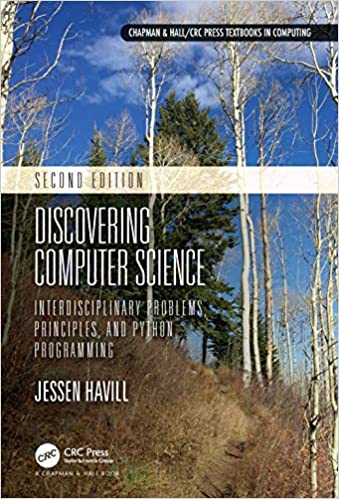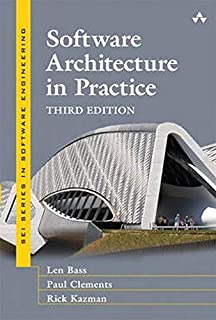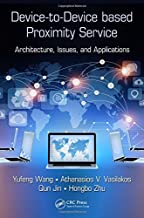Discovering Computer Science: Interdisciplinary Problems, Principles, and Python Programming
Original price was: ₹7,430.22.₹5,944.18Current price is: ₹5,944.18.
ISBN: 9780367472498
Author/Editor: Jessen Havill
Publisher: CRC Press
Year: 2020
1 in stock (can be backordered)
Description
Havill’s problem-driven approach introduces algorithmic concepts in context and motivates students with a wide range of interests and backgrounds.”
— Janet Davis, Associate Professor and Microsoft Chair of Computer Science, Whitman College
“This book looks really great and takes exactly the approach I think should be used for a CS 1 course. I think it really fills a need in the textbook landscape.”
— Marie desJardins, Dean of the College of Organizational, Computational, and Information Sciences, Simmons University
“Discovering Computer Science is a refreshing departure from introductory programming texts, offering students a much more sincere introduction to the breadth and complexity of this ever-growing field.”
— James Deverick, Senior Lecturer, The College of William and Mary
“This unique introduction to the science of computing guides students through broad and universal approaches to problem solving in a variety of contexts and their ultimate implementation as computer programs.”
— Daniel Kaplan, DeWitt Wallace Professor, Macalester College
Discovering Computer Science: Interdisciplinary Problems, Principles, and Python Programming is a problem-oriented introduction to computational problem solving and programming in Python, appropriate for a first course for computer science majors, a more targeted disciplinary computing course or, at a slower pace, any introductory computer science course for a general audience.
Realizing that an organization around language features only resonates with a narrow audience, this textbook instead connects programming to students’ prior interests using a range of authentic problems from the natural and social sciences and the digital humanities. The presentation begins with an introduction to the problem-solving process, contextualizing programming as an essential component. Then, as the book progresses, each chapter guides students through solutions to increasingly complex problems, using a spiral approach to introduce Python language features.
The text also places programming in the context of fundamental computer science principles, such as abstraction, efficiency, testing, and algorithmic techniques, offering glimpses of topics that are traditionally put off until later courses.
This book contains 30 well-developed independent projects that encourage students to explore questions across disciplinary boundaries, over 750 homework exercises, and 300 integrated reflection questions engage students in problem solving and active reading.
The accompanying website – https://www.discoveringcs.net – includes more advanced content, solutions to selected exercises, sample code and data files, and pointers for further exploration.
Additional information
| Weight | 1 kg |
|---|
Product Properties
| Year of Publication | 2020 |
|---|---|
| Table of Contents | Preface Acknowledgments About the author How to Solve It UNDERSTAND THE PROBLEM DESIGN AN ALGORITHM WRITE A PROGRAM LOOK BACK SUMMARY AND FURTHER DISCOVERY Visualizing Abstraction DATA ABSTRACTION DRAWING FLOWERS AND PLOTTING EARTHQUAKES FUNCTIONAL ABSTRACTION PROGRAMMING IN STYLE A RETURN TO FUNCTIONS SCOPE AND NAMESPACES SUMMARY AND FURTHER DISCOVERY Inside a Computer COMPUTERS ARE DUMB EVERYTHING IS BITS COMPUTER ARITHMETIC BINARY ARITHMETIC THE UNIVERSAL MACHINE Growth and Decay ACCUMULATORS DATA VISUALIZATION CONDITIONAL ITERATION CONTINUOUS MODELS NUMERICAL ANALYSIS SUMMING UP FURTHER DISCOVERY PROJECTS Forks in the Road RANDOM WALKS PSEUDORANDOM NUMBER GENERATORS SIMULATING PROBABILITY DISTRIBUTIONS BACK TO BOOLEANS DEFENSIVE PROGRAMMING GUESS MY NUMBER SUMMARY AND FURTHER DISCOVERY PROJECTS Text, Documents, and DNA FIRST STEPS TEXT DOCUMENTS A CONCORDANCE WORD FREQUENCY TRENDS COMPARING TEXTS TIME COMPLEXITY COMPUTATIONAL GENOMICS SUMMARY AND FURTHER DISCOVERY PROJECTS Data Analysis SUMMARY STATISTICS WRANGLING DATA TALLYING FREQUENCIES READING TABULAR DATA DESIGNING EFFICIENT ALGORITHMS LINEAR REGRESSION DATA CLUSTERING SUMMARY AND FURTHER DISCOVERY PROJECTS Flatland TABULAR DATA THE GAME OF LIFE DIGITAL IMAGES SUMMARY AND FURTHER DISCOVERY PROJECTS Self-similarity and Recursion FRACTALS RECURSION AND ITERATION THE MYTHICAL TOWER OF HANOI RECURSIVE LINEAR SEARCH DIVIDE AND CONQUER LINDENMAYER SYSTEMS 9SUMMARY AND FURTHER DISCOVERY PROJECTS Organizing Data BINARY SEARCH SELECTION SORT INSERTION SORT EFFICIENT SORTING TRACTABLE AND INTRACTABLE ALGORITHMS SUMMARY AND FURTHER DISCOVERY PROJECTS Networks MODELING WITH GRAPHS SHORTEST PATHS IT'S A SMALL WORLD RANDOM GRAPHS SUMMARY AND FURTHER DISCOVERY PROJECTS Object-oriented Design SIMULATING AN EPIDEMIC OPERATORS AND POLYMORPHISM A FLOCKING SIMULATION A STACK ADT A DICTIONARY ADT SUMMARY AND FURTHER DISCOVERY PROJECTS Bibliography Appendix A Python Library Appendix B Selected Exercise Index show less Review quote "Havill's problem-driven approach introduces algorithmic concepts in context and motivates students with a wide range of interests and backgrounds." -- Janet Davis, Associate Professor and Microsoft Chair of Computer Science, Whitman College |
| Author | Jessen Havill |
| ISBN/ISSN | 9780367472498 |
| Binding | paperback |
| Edition | 1 |
| Publisher | CRC Press |
You must be logged in to post a review.






Reviews
There are no reviews yet.